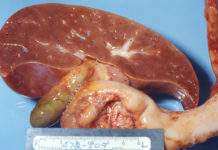
Gastric bypass surgery is associated with greater weight loss than sleeve gastrectomy or adjustable gastric banding
Among the three most commonly carried out weight loss (bariatric) procedures in adults, gastric bypass surgery causes greater initial and sustained weight loss than either sleeve gastrectomy or adjustable gastric banding.
Results of a long-term study of bariatric surgery published in the Annals of Internal Medicine came to this conclusion.
Bariatric surgeons use various operations to help people lose weight by making changes to their digestive system. National Institutes of Health guidelines in USA consider people with a BMI of 40 kg/m2, or at least 35 kg/m2 for people with diabetes or other obesity-related diseases, eligible for bariatric surgery. BMI or body mass index is a measure of obesity expressed as a ratio of body weight and square of the height.
“Bariatric surgery is widely considered the most effective way to treat severe obesity and induce long-term weight loss,” said first author David Arterburn and senior investigator at Kaiser Permanente Washington Health Research Institute.
People who had gastric bypass surgery had lost 31 percent of their weight at the first year and maintained 26 percent of their loss at 5 years
Although sleeve gastrectomy has become the most commonly performed bariatric procedure in many parts of the world but there is less evidence available to compare it against the longstanding gastric bypass and adjustable gastric band.
The findings of the study were :
• People who had gastric bypass surgery had lost 31 percent of their weight at the first year and maintained 26 percent of their loss at 5 years.
• People who had sleeve gastrectomy had lost 25 percent of their pre-surgery body weight at 1 year and maintained 19 percent weight loss at 5 years.
• That translates into a 19-pound difference in weight loss between gastric bypass and sleeve gastrectomy at 5 years for the average person in this study, who weighed 277 pounds before surgery.
• By contrast, adjustable gastric banding was much less effective for losing weight and keeping it off, with 14 percent and 12 percent of weight lost at 1 and 5 years, respectively. Gastric banding used to be the most commonly performed bariatric procedure, but it now represents just 10 percent of bariatric procedures.
“These findings give strong evidence that bypass and sleeve are effective for lasting weight loss for adults with severe obesity,” said Kathleen study leader and an associate professor of medicine and epidemiology at the University of Pittsburgh. “We hope this helps people to make more informed decisions about their care, as they talk with their health care providers about the respective benefits and risks of the most common weight-loss procedures.”
Similar results were seen in teenagers.
The 30-day risk of major adverse events, such as a lengthy hospitalization or another operation, were generally low across all three procedures. Sleeve gastrectomy had the lowest rate of major adverse events (2.6 percent), followed by gastric banding (2.9 percent), and then gastric bypass (5.0 percent).













